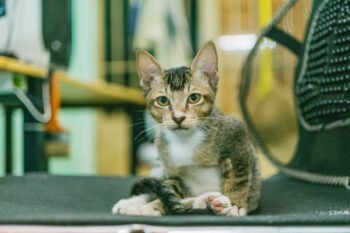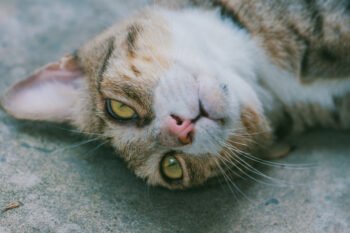You probably wouldn’t encourage a toddler to smoke, but if you subject your pet to secondhand smoke, you might as well be offering kitty a cigarette. “The correlation is similar to what is seen in children: Smaller lungs have less reserve and are more likely to be affected,” says Laura Sullivan, DVM, of Cascade Hospital for Animals, in Grand Rapids, Mich.
Recent studies confirm Dr. Sullivan’s assertion, warning that secondhand smoke may lead to deadly diseases in your cat. So if personal health risks haven’t compelled you and your houseguests to quit smoking yet, there is a new incentive: the well-being of your cat.
Consider the Dangers
The health risks associated with inhaling secondhand smoke have proved to be just as worrisome for cats as they are for people. But unlike you, your cat doesn’t have the choice to escape the environment to get fresher air, says Shera Dickie, DVM, of St. Julian’s Cat Care, in Dearborn, Mich. What’s more, pollutants from the smoky air collect on your pet’s coat. Since cats are meticulous groomers, they can easily ingest these harmful substances as they lick their fur.
According to a Swedish study cited by Dr. Dickie, “six out of seven cats that lived in a smoking home had pathological changes in their lungs.” These changes foretold the emergence of cancer for the majority of the cats. Here are a few other diseases your cat runs the risk of developing if regularly exposed to secondhand smoke:
-
Malignant lymphoma This aggressive type of cancer occurs in the lymph nodes and can be fatal. In fact, “Three out of four cats with this disease are dead within a year of diagnosis,” says Dr. Dickie. Cats living with smokers are twice as likely to get this disease, and the risk elevates with increased exposure.
-
Squamous cell carcinoma This type of cancer plagues a cat’s mouth. A study conducted at Tufts College of Veterinary Medicine found there is a higher incidence of this illness among cats living with smokers for more than five years.
-
Nicotine poisoning Feline explorers drawn to unknown objects, like a forgotten cigarette butt, are especially threatened by nicotine poisoning. The affliction occurs when a cat ingests tobacco. Cigarette butts contain much harmful nicotine — about 25 percent of the nicotine of a whole cigarette — so even a small cigarette butt can lead to the death of a cat.
-
Asthma Cats exposed to secondhand smoke are not only more susceptible to asthma, but they also “tend to heal slower from respiratory diseases, such as viral infections and pneumonia,” notes Dr. Sullivan. Increased coughing and breathing difficulty is a possible sign that your kitty suffers around secondhand smoke.
What Can You Do Now?
Proactive, responsible owners have many options to protect their cat from secondhand smoke. But how do you do that if you can’t quit smoking so easily? Here are four tips to guide even the most addicted smoker:
-
Designate smoke-free areas Consider smoking outside, or smoke only in rooms that pets are not allowed in. The less the exposure, the greater the chances your cat will stay healthy.
-
Use air filters Air filters may help clean the environment, removing harmful chemicals in the air that could block your kitty’s respiratory passage.
-
Clean your pet and your house Regular baths, or at the very least wipe-downs with a damp cloth, can help remove smoke residue from cat fur, says Dr. Dickie. Vacuum and keep all cigarette butts, tobacco products and even nicotine patches out of sight to prevent accidental illness, poisoning or even death.
-
Look for symptoms Excessive drooling or difficulty eating are symptoms of oral cancer, while labored breathing is a sign of lung cancer. Observe your cat frequently, since catching diseases early on always helps with treatment. If something is out of the ordinary, contact your veterinarian immediately.
The best solution of all? Quitting if you’re a smoker — and encouraging cigarette-carrying visitors to do the same. In the words of Dr. Dickie: “Why expose your beloved furry friend to a potentially preventable disease?”







